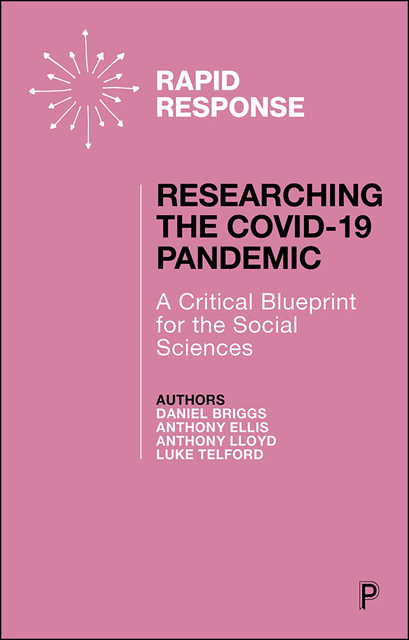Book contents
- Frontmatter
- Dedication
- Contents
- List of figures and tables
- Acknowledgements
- Foreword
- 1 Apocalypse then: The world pre-COVID-19 and the state of the social sciences
- 2 Viral Armageddon: The spread and impact of COVID-19
- 3 Apocalypse now: The (desk-based) scramble for knowledge
- 4 Studying the COVID-19 pandemic as it happens
- 5 Apocalyptic futures: An appeal to the social sciences
- Notes
- References
Foreword
Published online by Cambridge University Press: 15 April 2023
- Frontmatter
- Dedication
- Contents
- List of figures and tables
- Acknowledgements
- Foreword
- 1 Apocalypse then: The world pre-COVID-19 and the state of the social sciences
- 2 Viral Armageddon: The spread and impact of COVID-19
- 3 Apocalypse now: The (desk-based) scramble for knowledge
- 4 Studying the COVID-19 pandemic as it happens
- 5 Apocalyptic futures: An appeal to the social sciences
- Notes
- References
Summary
It was quite surreal, looking back. The first whispers of a new and deadly disease emerging from Wuhan in China at the tail end of 2019 were easy to ignore. But as time passed and it became clear that we were witnessing a global pandemic, and that many all over the world would die, it was impossible to look away from the media as I struggled to get a handle on what it all meant. I remember very clearly the day Boris Johnson, the Prime Minister of the United Kingdom, told us to return home and remain there. The rhythms of everyday life came immediately to an end. News of panic buying worried me slightly, as did the daily figure of Covid-related deaths. Like many people, I assume, my thoughts turned to my elderly mother and father. Older people, we were told, were the principal victims.
As time passed, I became more sceptical and returned to my role as a critical social scientist. But those first days will live long in my memory. We were living through a moment of profound importance, and for many people it quickly became clear that things would never be the same again. For some, things got easier. Billionaires quickly increased their already obscene wealth, and the professional middle classes have generally benefitted from working from home, rising property prices and the new expectation that everything can be delivered quickly to one's door. But for many others, things got a lot harder. Ethnic minorities appear to have disproportionately suffered Covid-related deaths. Those trapped in inadequate housing suffered greatly during lockdowns. Poorly paid service workers were revealed as an unacknowledged and underappreciated force upon which we all depend. Some were trapped in a confined space with an abusive partner. Reliance on alcohol appears to have increased. And our withdrawal from social life has exacerbated many existing problems while also creating new ones. Many illnesses have been left untreated as our national healthcare systems have been refocused on COVID or moved online. Before COVID struck, anxiety was already a corrosive and ubiquitous malady, and with lockdowns things got quickly worse.
From quite early in the crisis, it was possible to discern the gradual alteration of the global political economy.
- Type
- Chapter
- Information
- Researching the COVID-19 PandemicA Critical Blueprint for the Social Sciences, pp. xi - xivPublisher: Bristol University PressFirst published in: 2023



